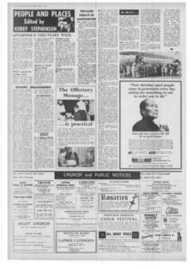Page 7, 7th April 1967
Page 7

Report an error
Noticed an error on this page?If you've noticed an error in this article please click here to report it.
Tags
Share
Related articles
Shaw To Write Dialogue For Film On St. Francis
Cross And Keys
Deconstructing St Joan
Shaw's Saint Joan
Films By Grace Conway Good-but Not Great I Joan Of...
FILMS
A Man for All Seasons
BERNARD SHAW, as an avowed agnostic, writing "St. Joan", included a typically quizzical epilogue to take in the canonization of England's enemy, Joan of Arc. Robert Bolt has done no such thing for St. Thomas More in A Man for All Seasons ("U", Odeon, Haymarket) either in the original play or in the film which Bolt himself has written.
As a born dramatist, Bolt has simply seen the story of More's (Paul Schofield) career of public service crowned with execution as perhaps the most crucial personal drama in English history. It is a drama of conscience and integrity on More's side, of royal treason and tyranny on King Henry VIII's (Robert Shaw).
In the play questions of sanctity and controversy were stripped to a minimum to concentrate on the main controversy, the issue which brought More to the scaffold: whether to accept the authority of God and His Church or of the Tudor King, who tried to take over the Church.
Bolt focused all on a portrait in the round of More as described by Robert Whittinton: "A man of angel's wit and singular learning. I know not this fellow. For where is the man of that gentleness, lowliness and affability. And as time required. a man of marvellous mirth and pastimes, and sometime of as sad gravity. A man for all seasons."
So we had—and have— More as the family man, head of the Chelsea household where talk shone, games were played and prayers prayed, as the friend and loyal servant of the King— "but God's first"as the defender of Queen Catherine against the King's and Wolsey's machinations for divorce. as Lord Chancellor of England. the great lawyer twisting his accusers with his sweet tongue, but unable to avert their determination to chop off his head.
The film is directed by Fred Zinnemann, who made such a superb movie of "A Nun's Story". He has done as impeccably by "A Man for All Seasons". Inevitably, in the expansion of medium, in the increase of explanation (though still not quite enough, so widespread is ignorance) and of decorative background the open fields of Chelsea, Westminster Hall, the Tower —the great drama is spread a little thinner in places.
On the other hand, the performance of Paul Schofield seems, if possible, even more marvellous. Or perhaps it only benefits from the cinema's faculty for bringing it closer. in finer richer detail. Not since Pierre Fresnay's "Monsieur Vincent" have I been 'so deeply convinced by an actor's identification with his subject.
By comparison, Robert Shaw's Henry VIII is superficial: splendidly the selfwilled young hearty. but surely Henry, for all his iniquities, had some regal presence, and until he grew too gross, compelling charm.
After Schofield's, the only performance which makes a substantial contribution (not forgetting Orson Welles's Wolsey or Vanessa Redgrave's unspoken moment as Ann Boleyn) is Wendy Hiller as the sharped-tongued, devoted Lady Alice More. But the carefully picked cast, like every detail of this great production is immaculate.
I don't know whether Bolt would endorse Chesterton's view that More "may come to be regarded as the greatest Englishman, or at least the greatest historical character in English history." Anyway his play and his film will have helped to make Chesterton's assessment come true.
Certainly a man for all seasons, this great English Catholic who was also recognised as a great European Christian humanist. Perhaps especially, almost providentially one for our season, where the issues before his fellow-Catholics so signally re-echo those of More's desperate days.
To my knowledge, for nearly 20 years, the International Catholic Film Office and other Catholic bodies have been formulating projects for a film about St. Thomas More. Whichever of them might have materialised could never have achieved the commercial and technical scale and scope of this unbiassed account of the inspiring story. If the film sends even a proportion of the public, back to the very full, authenticated sources, or to Chamber's luminous biography, Bolt will have done much to spread Chamber's view of St. Thomas More as the greatest Englishman since St. Boniface.
On the stage, How to Succeed in Business without Really Trying ("U", Astoria) struck me as a mildly amusing trifle about a Mr. Cinders who buys the book on how to succeed, and by applying every obvious gimmick get to the top including a strawberry blonde (Maureen Arthur) for the top brass. On the screen the mildly amusing, mildly agreeable story spins out to two hours.
The hero (Robert Morse) is inoffensive, the tunes no better than innocuous, the chorus of executives and male and female staff predictably not even glamorous. Among tycoons Rudy Vallee remains benignly laughable.
Jean-Luc Godard is today one of the big names in the French cinema. A Woman is a Woman ("X", Jacey, Marble Arch) was made on his way to the top, before he had made Anna Karina an international pin-up. The little talc of her trying to decide whether she loves JeanClaude Brialy, who likes her but does not want to be a father, or Jean-Paul Belmondo, who loves her at any price, is only mildly amusing too.
But Karina is beautiful and alluring, both suitors are entertaining. the colour is refreshing, and at under an hour and a half there is no risk of tedium even if surprise were not an ever-present, built-in possibility,
blog comments powered by Disqus











